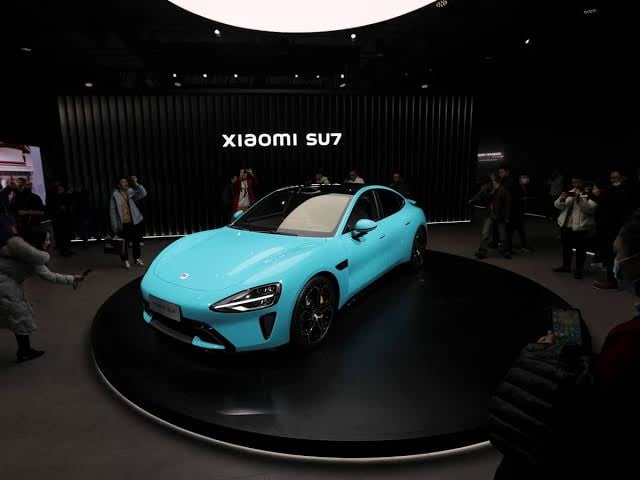Phone Maker Xiaomi Bets Big on Electric Vehicles

Chinese tech giant Xiaomi is making a bold move by venturing into the competitive electric vehicle (EV) market. The company aims to capture a niche of affluent consumers with its upcoming premium EV, leveraging its existing 20 million premium smartphone users in China.
The yet-to-be-priced SU7 electric car marks Xiaomi's foray into the auto industry, backed by a $10 billion investment in development. With plans for domestic deliveries starting in Q2 2024, Xiaomi is optimistic about its EV prospects.
Xiaomi's strategy revolves around ecosystem development and its successful smartphone "premiumization" strategy, which has seen significant progress since its launch in 2020. The company is drawing parallels with its Xiaomi 14 phone, benchmarking it against Apple's iPhone 15 Pro and claiming it is outperforming the competition.
However, Xiaomi faces challenges from established EV players like BYD, which are slashing prices to gain market share. Additionally, Huawei, with its competitive pricing and smartphone dominance in China, is making inroads into the EV market.
Xiaomi's approach to differentiation lies in its HyperOSoperating system, which incorporates AI to learn user behavior and adjust connected devices, including its forthcoming car. The company envisions a "human x car x home" ecosystem with seamless integration between devices.
What Does This Mean for Me?
With an eye on long-term survival in the increasingly competitive EV industry, Xiaomi plans to construct its production facilities and manufacture key components in-house. The company recently inaugurated a smartphone factory in Beijing with a production capacity of over 10 million devices.
Although the timeline for the SU7 EV's international launch remains undisclosed, Xiaomi estimates that it will likely take two to three years to enter global markets.
More News
.webp)
Japan’s Rate Shift Is Rippling Through Global Bond Markets
1 week ago

China’s Growth Engine Stalls as Consumers and Investors Pull Back
1 week ago

Egypt’s Recovery Gains Traction as Household Pressure Lingers
3 weeks ago

OECD Warns AI and Tariffs Will Test the Global Economy
3 weeks ago

Zero Tariffs, Higher Drug Bills as US and UK Reset Pharma Trade
3 weeks ago

Catastrophe Bonds Go Global as Climate Risk Meets Yield Hunting
1 month ago
.webp)
Canada Shields Steel and Lumber Industries From Tariffs
1 month ago

Trump Drops Selected Tariffs in Response to Inflation Pressures
1 month ago